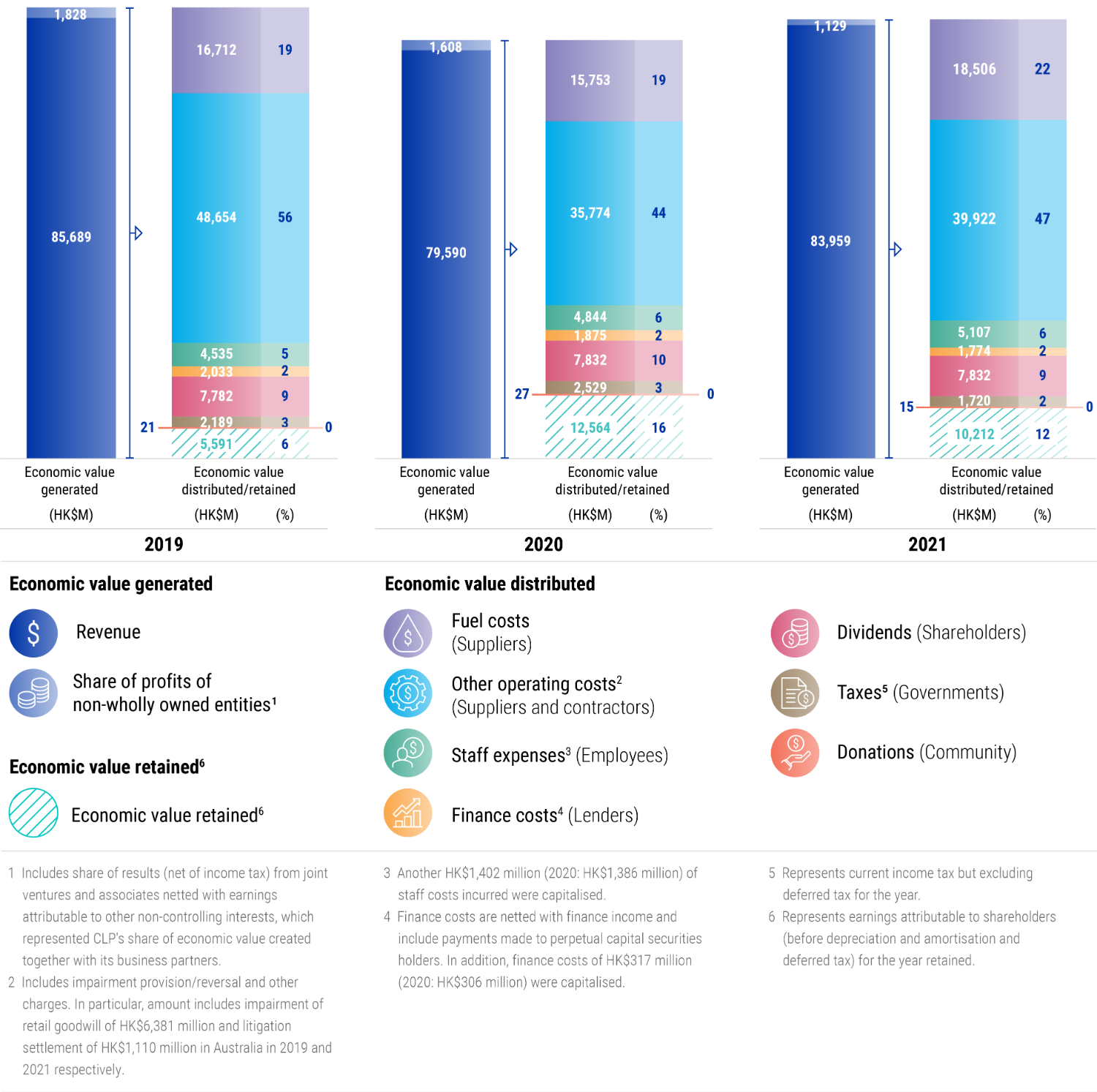Impact material topics
Bearing in mind different stakeholder interests, CLP emphasises value creation over the long term, and does this in a way that helps serve the communities in which it operates.
GRI reference: 3-2, 201-1
One way to understand this emphasis is through the value created and distributed by CLP to different stakeholders. In 2021, 88% of the economic value generated by CLP was distributed to stakeholders, including employees, suppliers and contractors, lenders, shareholders, governments and the community at large.
As shown in the chart below, and after excluding the impairment of retail goodwill of HK$6,381 million and litigation settlement of HK$1,110 million in Australia in 2019 and 2021 respectively, this economic value distributed from the Group’s businesses has been relatively stable in the last three years.
Economic value generated and distributed by CLP: 2019 to 2021

Another way to understand how CLP creates value is through the impact materiality assessment. For instance, the positive impacts created through providing services, purchasing goods and services, creating jobs, and investing in the community. It also provides an understanding of the negative impact of CLP’s operations, including the impacts of GHG emissions and safety incidents, all of which CLP strives to minimise.
Based on discussions at the 2021 prioritisation workshop and taking into account best practices amongst peer companies and stakeholder feedback, CLP has identified three topics that currently have the most material impact on its stakeholders.
1. Shaping and executing the transition to net-zero
CLP’s growth opportunities are positioned around becoming a Utility of the Future. In pursuit of this ambition, one key area for CLP is to decarbonise its existing assets by investing in clean electricity infrastructure to ensure a reliable energy grid. The lower emissions that result from transitioning to net-zero benefit the environment and, by extension, the community. Benefits come through lowering GHG and other air emissions and reducing resource use associated with fuel extraction and transport.
While government and regulatory bodies propose new or updated carbon reduction targets, as one of the major emitters, electric utilities are expected to act as a trusted partner for governments, communities and customers in energy transition. In doing so, an electric utility must manage the social impact of decarbonisation carefully such that no stakeholder groups will have to bear disproportionate costs. Further to this, CLP seeks to support the economy by facilitating major investment in critical supply chains and infrastructure.
2. Reinforcing resilience in a changing operating environment
In a volatile operating environment, disruption can occur at any point along CLP’s value chain, for example, in its supply chain, within the Company’s operational boundaries, or amongst customers. COVID-19, alongside the accelerating pace of environmental, technological, regulatory and social change, has reinforced the importance of business resilience.
CLP recognises the strategic value of anticipating, withstanding and learning from disruptive events. An increased severity and frequency in extreme climate events has been observed in recent years. Building resilience in a changing climate is crucial for CLP to ensure its customers can rely on an undisturbed electricity supply, and that its employees will not be exposed to unnecessary risks. As the power system is becoming more digitalised and connected, reinforcing cyber resilience and data protection shields the critical infrastructure provided by CLP against cyber threats and data breaches.
3. Aligning business activities with community, employees and customer expectations
The time when the sole purpose of a business was to make profit is long passed. As a purpose-led business, CLP recognises its obligation to meet evolving stakeholder expectations around the positive role business can play in society.
Often these expectations are aligned with the business case that as the electricity system becomes more complex and extends beyond the traditional realms of a power utility, CLP has the opportunity to deepen its value proposition with the right partners to deploy customer-facing energy solutions. The Group recognises this expectation of forming collaborative partnerships to fast-track the delivery of energy solutions.
A company relies upon its employees to deliver its business strategy and serve its customers. A minimal expectation on a responsible employer is to promote workplace safety and well-being. As the business evolves with the changing operating environment, it is important to foster agility, diversity and inclusion and to attract and retain future talents. Together, fulfilling these expectations of the workplace will help empower employees to express innovative ideas, adopt new ways of working, and make CLP an attractive company in which they can develop their career.
The responsibilities of a company should not be constrained to its own operations. A company must consider its supply chain and ensure that labour standards are upheld in the supply chain, including the elimination of all forms of modern slavery and labour exploitation. Through exercising its purchasing power, a company must also consider its role in strengthening supplier businesses, and the benefit this has on local economies. In building a Utility of the Future, CLP recognises that an economic system that respects and upholds non-financial value creation, such as social value, is likely to be fairer and more resilient over the longer term.


